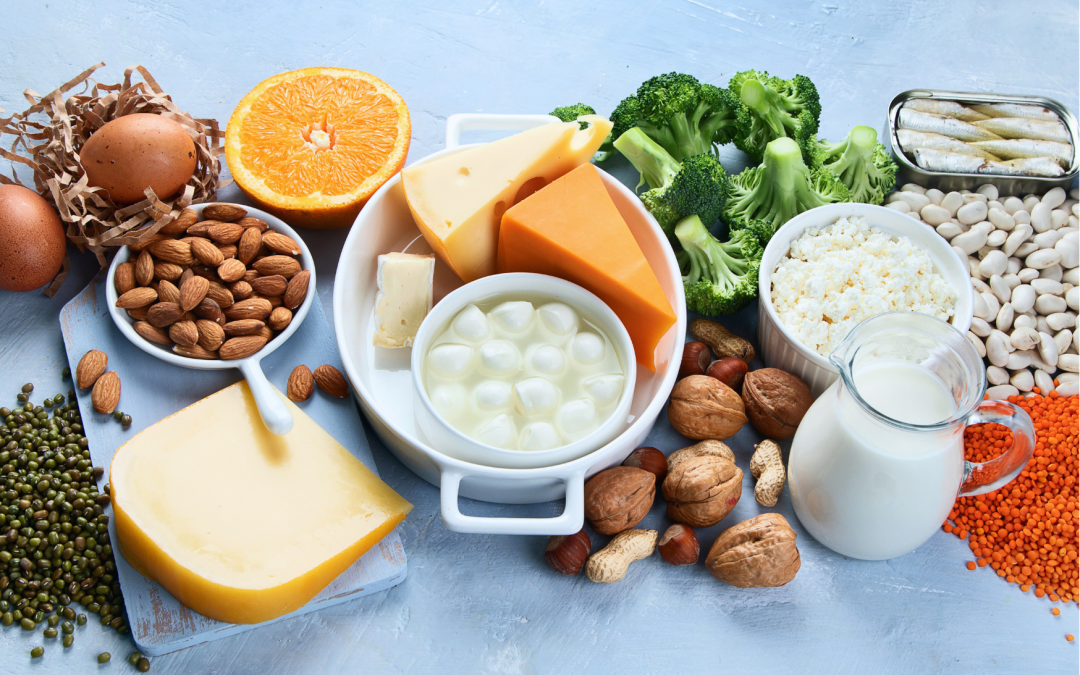During perimenopause, oestrogen levels start to decline. Oestrogen is a hormone that helps maintain bone density. Oestrogen can increase calcium absorption by stimulating certain enzymes in the kidneys. The reduction in oestrogen leading up to menopause can therefore accelerate bone loss, increasing the risk of osteoporosis—a condition characterized by weak and brittle bones.
Increased Risk of Osteoporosis
The risk of osteoporosis increases dramatically during and after menopause. According to the National Osteoporosis Foundation, women can lose up to 20% of their bone density in the 5-7 years following menopause. Ensuring adequate calcium intake can help mitigate this bone loss.
Maintaining Bone Health
Adequate calcium intake, combined with vitamin D (which helps the body absorb calcium), is crucial for maintaining bone health and reducing the risk of fractures. The recommended daily intake of calcium for women over 50 is 1,200mg. Other nutrients that are essential for bone health include protein, magnesium, phosphorus, potassium, vitamins A and K2.
Best Sources of Calcium
- Dairy Products
- Milk: One of the richest sources of calcium.
- Cheese: Varieties like cheddar and mozzarella are high in calcium.
- Yogurt: Provides calcium along with probiotics for gut health.
- Non-Dairy Sources
- Leafy Greens: Kale, broccoli, and bok choy.
- Nuts, seeds and legumes: chia seeds, sesame seeds and tahini, chickpeas, lentils.
- Fish: Sardines and salmon with bones.
- Fortified Foods: Orange juice, cereals, and plant-based milk.
- Supplements
For those who cannot meet their calcium needs through diet alone, supplements can be a helpful option. However, it is essential to consult with a healthcare provider before starting any supplement regimen as using the incorrect form or dose, or not understanding the whole health picture may cause more serious health issues.
For more information about calcium, read on here.
Lifestyle Tips for Better Calcium Absorption
- Combine with Vitamin D: Spend time in sunlight or consume foods rich in vitamin D (e.g., fatty fish, fortified foods) to enhance calcium absorption.
- Limit Caffeine and Alcohol: Excessive consumption can interfere with calcium absorption.
- Stay Active: Weight-bearing exercises like walking, jogging, and strength training can help maintain bone density.
- Reducing inflammation: Chronic inflammation in the body (whether from chronic stress, illness, lack of movement or poor dietary choices), can lead to a poor acid alkaline balance. The body will always try to buffer an acidic environment by finding an alkaline source, and one way is to leach calcium from bones. Addressing inflammation by enjoying a wholefood diet rich in plant foods, good quality protein and healthy fats, particularly omega 3 fatty acids found in fish, seaweed, nuts and seeds can help.
Ensuring adequate calcium intake during menopause is crucial for maintaining bone health and reducing the risk of osteoporosis. By incorporating calcium-rich foods into your diet and adopting lifestyle habits that enhance calcium absorption, you can support your bone health during this significant life stage.

